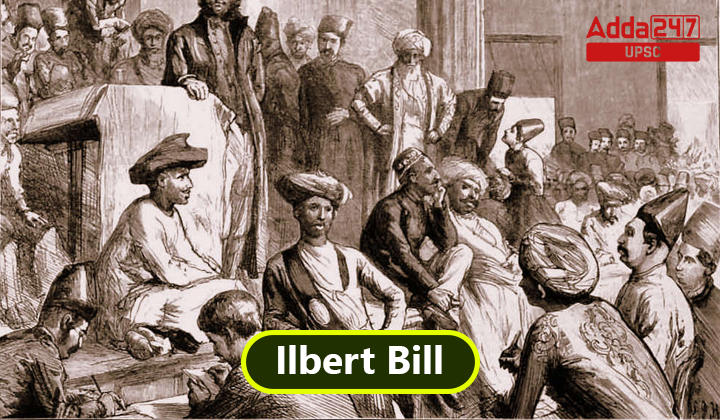Table of Contents
What is Ilbert Bill?
Before 1883, British people in India didn’t have to go to regular Indian courts when they broke the law. For really serious stuff like crimes that could get them killed or sent away, only the higher courts dealt with their cases.
But in 1883, a new law called the Ilbert Bill changed this. It said that from then on, British and European folks would be judged by Indian judges in lower-level courts. This made many European people very mad.
Ilbert Bill Controversy
- The idea of Europeans being judged by Indians, who were seen as less important by the Europeans, made a lot of people very angry and upset. The Ilbert Bill sparked strong protests, especially among the European business community in Calcutta, including tea and indigo planters.
- Many officials also secretly sympathized with this anger. The controversy of that time was deeply rooted in racial prejudices that were common back then. Some people spread the idea that Indian judges couldn’t be trusted to handle cases involving English women, which gained a lot of support against the bill.
- English women who opposed the bill argued that Bengali women, whom they unfairly saw as “ignorant,” were not treated well by their men. Therefore, they said Bengali women shouldn’t have the right to judge cases involving English women.
- In response, Bengali women who supported the bill argued that they were actually more educated than the English women who opposed the bill. They also pointed out that more Indian women had academic degrees than British women at the time. This was a reference to the fact that the University of Calcutta started admitting female graduates to its degree programs in 1878 before any British universities did the same.
History of Ilbert Bill
The Ilbert Bill, also known as the Ilbert Bill controversy, was a significant legislative proposal during British colonial rule in India in the late 19th century. The bill was named after Sir Courtenay Peregrine Ilbert, the legal member of the Viceroy’s Executive Council in India, who introduced it in 1883. The primary aim of the Ilbert Bill was to reform the existing legal system in British India.
The key background and context of the Ilbert Bill can be summarized as follows:
- Legal Disparities: During the British colonial period in India, there were racial and legal disparities in the administration of justice. European British subjects were governed by one set of laws, which were more favorable to them, while Indian subjects were governed by another set of laws, which were often less favorable to them. European British subjects were often reluctant to have Indian judges preside over cases involving them.
- Proposed Reforms: Sir Courtenay Peregrine Ilbert proposed the Ilbert Bill to address these disparities and create a more equitable legal system. The bill aimed to allow Indian judges to preside over cases involving European British subjects, as well as Indian subjects, without regard to the race of the defendant or plaintiff.
- Controversy: The introduction of the Ilbert Bill sparked significant controversy, primarily from the European British community in India. They opposed the idea of Indian judges having jurisdiction over European British subjects and feared that this would undermine their privileged legal status.
- Amendments: To appease the European British community, several amendments were made to the original Ilbert Bill. These amendments imposed certain limitations, including the provision that Indian judges could only preside over cases involving European British subjects if the crime was committed in areas where the majority of the population was Indian. This compromise effectively retained many of the racial distinctions in the legal system.
The Ilbert Bill controversy brought attention to the deep-seated racial prejudices and discrimination inherent in British colonial rule in India. Despite the compromises, the bill marked a step toward legal reforms and equal treatment under the law, although it fell short of achieving complete parity in the legal system.
Who introduced Ilbert Bill?
The Ilbert Bill was introduced by Sir Courtenay Pergine Ilbert, the Law Member of the Viceroy’s Council, on February 9, 1883, during the viceroyalty of the Marquess of Ripon. The bill sought to abolish the judicial disqualification of Indian judges to try European British subjects. This was a major step towards racial equality in India, but it was met with fierce opposition from the European community, who feared that they would no longer be able to receive fair trials in Indian courts.
The Ilbert Bill was eventually passed into law but in a weakened form. It was amended to give European defendants the right to demand a jury trial, with half of the jurors being Europeans. This was a significant compromise, but it was still a major victory for Indian nationalists. The Ilbert Bill controversy had a profound impact on Indian politics. It showed that the British were not willing to grant full equality to Indians, and it helped to galvanize the Indian nationalist movement.
Resolution for Ilbert Bill Conflict?
- Widespread disapproval of the bill, especially among British citizens, including women.
- Viceroy Ripon introduced an amendment requiring a jury of 50% Europeans when an Indian judge had to preside over a case involving a European.
- A compromise was eventually reached, granting jurisdiction to try Europeans to both European and Indian District Magistrates and Session Judges.
- Defendants had the right to request a trial by a jury, with at least half the jury members being European.
- The bill was passed on January 25th, 1884, and it became effective on May 1st of the same year.
- The compromise and the controversy deepened hostilities between the British and Indians.
- The Indian National Congress was formed in the next two years, setting the stage for the Indian Freedom Struggle and subsequent revolutionary movements in India.
Consequences of Ilbert Bill
The Ilbert Bill caused unrest within the British community in India and faced strong opposition from British officials who, with hidden sympathies, opposed the idea of granting Indian judges the authority to preside over cases involving Europeans, as they considered Europeans to be superior. This opposition was further echoed by British women, who argued that Bengali women lacked authority over English women due to their perceived lack of knowledge.
In contrast, proponents of the Ilbert Bill among Bengali women challenged this perspective by highlighting that there were more educated Bengali women compared to their English counterparts. They emphasized that Indian women held more college degrees than British women and pointed out that the University of Calcutta had allowed female graduates to pursue degree programs as early as 1878, preceding British universities in this regard.
| Relatable Article | |
| Muslim Women Act 2019 | Dowry Prohibition Act 1961 |
| Hindu Widow Remarriage Act 1856 | |



 TSPSC Group 1 Question Paper 2024, Downl...
TSPSC Group 1 Question Paper 2024, Downl...
 TSPSC Group 1 Answer key 2024 Out, Downl...
TSPSC Group 1 Answer key 2024 Out, Downl...
 Cabinet Ministers of India 2024, New Cab...
Cabinet Ministers of India 2024, New Cab...







